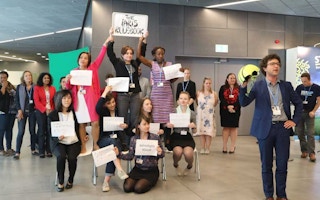United Nations (UN) human rights experts and civil society groups have raised concerns that a crucial meeting for implementing the Paris climate accord could be sabotaged by fossil fuels interests and restrictions on freedom of speech.
The next United Nations (UN) climate change meeting—COP24, to be held in November in Katowice, Poland, one of the world’s largest coal-producing countries—is billed as the make-or-break summit for the Paris Agreement, a pact signed by more than 200 countries to spare the planet from the worst effects of climate change.
COP24 aims to see nations adopt rules for implementing the Paris Agreement by 2020, but fossil fuel companies and lobbyists may try to thwart this objective, experts have warned.
The human rights experts, including Clement Nyaletsossi Voule, UN Special Rapporteur on the rights to freedom of peaceful assembly and association, and Joe Cannataci, UN Special Rapporteur on the right to privacy, have urged the Polish government to ensure full and free civil society participation at the climate talks.
For the COP24 to be a success, experts have called on the Polish Government to “do its utmost to prepare and hold the meeting in a manner that facilitates the climate change negotiations and also ensures meaningful civic space that is free from undue surveillance and restriction,” they said in a letter issued at the Bonn Climate Change Conference on May 7.
They reacted to the Polish government’s briefing guidelines for COP24 released on the same day in Bonn, which rights groups said included the provisions of a bill Poland’s president Andrzej Duda signed in late January that sought to ban spontaneous protests and allow police surveillance at the climate summit.
In particular, Article 17 of the bill gives sweeping surveillance powers to the police and secret services to collect and process personal data about all COP24 participants. Article 22 prevents spontaneous peaceful assemblies in Katowice, the human rights experts pointed out.
“Owing to the expected evolving nature of COP24, negotiations should be tolerated to allow for spontaneous protests to be freely and peacefully conducted,” they said.
Conflict of interest issues compound the human rights issues of holding COP24 in Katowice.
Experts in Bonn, Germany, where the previous climate talks were held, noted that Poland has been reluctant to agree with other members of the EU to increase their coal cut targets by up to 40 per cent, and to commit to further increases in their revised Nationally Determined Contributions (NDCs).
Alden Meyer, head of policy and strategy with non-profit Union of Concerned Scientists (UCS), said that despite Poland’s reluctance to support EU, he is still hopeful that the country understands that its role as the host nation will be “different from its role in its domestic policy.”
“But the proof is in the pudding,” he said at a press briefing.
At COP19 held in Warsaw in 2013, the Polish government engaged fossil fuel companies as corporate sponsors and hosted a parallel conference with the World Coal Association, called the International Coal and Climate Summit. At the same time civil society groups call for polluters to pay for damages to lives and properties in a warming world.
Polish climate envoy Tomasz Chruszczow, who has a leading role in this December’s Katowice climate summit, said everybody is welcome to COP24, including polluters.
“Even if they are now generating electricity from fossil fuels—the majority of electricity comes from fossil fuels—this is changing, but it is a process,” he said in an interview with Climate Change News.
UN climate chief Patricia Espinosa said in a media briefing in Bonn that she is aware of the political complexity of Poland hosting the next COP meeting, but she said there is willingness from the country to participate more meaningfully in the Paris Agreement.
“Poland is showing full commitment to make this agenda a success. They are seeing it as an opportunity to be more appropriately involved in the process,” she said.

















